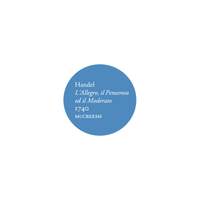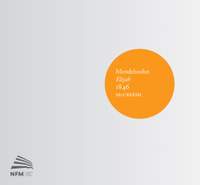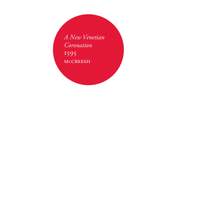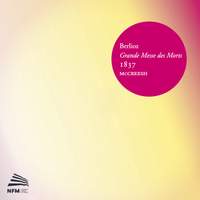Interview,
Paul McCreesh on Handel’s 'L’Allegro, il Penseroso ed il Moderato'
 L'Allegro, il Penseroso ed il Moderato is a curious work. Not really falling into any genre, it sees the advocates of two lifestyles - the lively, pleasure-seeking Allegro and the more Platonic, reflective Penseroso make the cases for their respective outlooks on life, before il Moderato steps in to suggest a middle ground.
L'Allegro, il Penseroso ed il Moderato is a curious work. Not really falling into any genre, it sees the advocates of two lifestyles - the lively, pleasure-seeking Allegro and the more Platonic, reflective Penseroso make the cases for their respective outlooks on life, before il Moderato steps in to suggest a middle ground.
The philosophical underpinning of the work is rich - with questions about balance in one's life that have been posed for millennia - and this, together with the libretto, draws a fascinatingly varied musical response from Handel.
I spoke to Paul McCreesh about his new disc of L'Allegro, il Penseroso ed il Moderato, and about some of the ideas that feed into it.
With vividly programmatic music of this kind, there’s always a risk that the work can descend into superficial gimmickry – an accusation often levelled unkindly at Haydn’s Creation and Seasons. What would you say to those who might say the same of L’Allegro?
I think it's nonsense, really! It's a comment that's made a lot about the two Haydn pieces (and we do plan to record The Seasons next year, actually). I think the pictorialism is by the by; it's the emotional content of the poetry which Handel paints so beautifully. We're not so cynical when Constable paints the most beautiful country scene, or Milton writes a beautiful poem, with metaphors from the countryside, or about Hardy’s novels, – so I've never really understood why, with music as subtle as that which Handel produces, especially in this piece, people should really have any objection to the odd moments of pictorialism.
Your past performances – Elijah and the Venetian sacred repertoire, for example – have been very much informed by authentic performance practices, and with this disc you say you're attempting to recreate the first performance. How did you approach this, and how can you be sure that the result is accurate in, as your notes say, "painstaking detail"?
Well, I think you just have to work a bit harder than some of my colleagues...! There’s certainly a lot of information out there, and Handel scholars have been very helpful. I mean, the point is there is nothing fundamentally wrong with doing your own, composite arrangement of L'Allegro; there's nothing actually wrong with playing Bach on the piano, there's nothing wrong with doing a Mahler symphony in an arrangement for a saxophone quartet. But the point is... I think if you've signed the chit that says that you're interested in HIP [historically-informed performance], and you play old instruments, it would seem a little bit half-baked to ignore major issues of structure and content.
The purpose of researching hard is actually to make something more vibrant and more modern, and to explore different perspectives; it's not an archaeological exercise, it's a way of trying to create something which is more consistent within itself; with L'Allegro, it’s interesting that the all of previous recordings which I know invent a version that Handel himself never would have heard.
So in fact what we're doing here is restoring the work which Handel himself actually performed, as opposed to the arrangements of the work which others have chosen to make. I think it's actually more interesting to get back to the original performances and find out how Handel himself wrote it, first time round. To me that’s an entirely logical process and an important interpretative decision.
For that matter, would you say L’Allegro is still relevant to contemporary audiences today? Many of the discussions of the relative merits of various pastimes seem rather dated – the references to hunting, for example!
I would disagree totally here. I think what is so important about L'Allegro is that it's a piece which fits into, if you like, the history of philosophy. It doesn't really matter whether you look back as far as Plato or whether you look back to the medieval period or whether you look back to Milton – or whether you look to the current age, with its constant desire to analyse and self-question. One of the constant themes in our lives is how much we allow ourselves to follow visceral pleasure, and how much we allow ourselves to moralise or intellectualise. Or to put another way: How much do we want to listen to the noise of the world, and to relate to the world – and how much do we want to philosophise and reflect outside that world?
And of course what the collection of poems is telling us, particularly in [Charles] Jennens's third part, is that we should strive for the inevitable ‘golden mean’ – an idea which again goes through the history of philosophy. There's nothing pathological about self-reflection, as long as you don't take it to pathological excess, and there's nothing wrong with enjoying a certain hedonism as long as it doesn't become grotesque. And I think that is actually a moral and a principle which is absolutely as valid to the twenty-first century, as it has been for every century. I think the beauty of this piece, and the beauty of many works of art, is the way it gives us time to reflect upon this message – a message which of course a very strong part of religion thought as well. So from that point of view I think it's a very, very topical piece.
Of course it's not necessarily a question of whether one goes hunting, or whether one chooses to view the constellations from the top of a tower; those are metaphors, some which would have been dated even in Handel's time – the references to Plato, for example. And rather than dating it, the beauty of this piece is that it explores philosophy through the prism of history – if that's not a slightly pretentious phrase to use! And it also does it without preaching; it's also full of the most sensuous music. And of course music and culture attract both Allegro and Penseroso – so musical pleasure itself is seen to be both sensual and philosophical – and part of that central golden mean we’ve mentioned .
For you, does the third part – added at Handel’s request to provide the “middle way” between the two extremes of Jennens’ original poem, and thus attach a kind of moral – fit with the text, or do you find it a rather artificial addition?
As is so often the case, when people talk about Handel's oratorios, I feel the spirit of the librettists always shines through in all these pieces, and we need credit the writers as much as composer – more than ever in L'Allegro. It is absolutely a tri-partite conception between Harris (who originally had the idea for the Miltonic libretto), Handel and Jennens, who, at Handel's request, provided a resolution in the third part. And it's been a tradition to be slightly sniffy about Jennens's additional part (one eighteenth-century wag called it Il Moderatissimo) partly because Jennens wasn't the poet that Milton was. The cult of Milton was such in the Eighteenth century that there was no way that anybody writing a pastiche of Milton was going to receive anything but mockery. But when you actually look at the way Jennens completes his addition of the third part it's very well-written, very clever and very apposite. It's not too long – and it does exactly what it needs to – it ties up the threads and it finishes with this beautiful duet which is based on a paraphrase of Shakespeare's The Tempest. So it makes a very satisfactory conclusion, and from that point of view it's a very well-written completion.
L’allegro is in my opinion one of the great pieces of Handel. It stands apart from his other works – it's not a dramatic oratorio, it's not an ode, it's not a pastorale, it has a unique flavour, and I hope that this recording will to some degree rehabilitate the piece. It's always been much loved by the slightly nerdy Handelians amongst us, but I think it actually deserves a far wider understanding. It is ravishingly beautiful music, it's a very intelligent piece.
If you had to pick a “side” in this particular musical argument, which would you choose?
Well that's a very interesting one! I think we can all be easily seduced by the sheer beauty of Penseroso's reflective music, but because Handel is so great at writing cheerful music, it’s easy to fall for Allegro’s music too. So I think perhaps I can't really answer the question – I'm probably with Jennens in the middle. I love the exuberance and jollity of Allegro's music, but I also the passion and beauty of the reflective music. I would think – and I would hope – that the listener will feel torn between the two.
Lastly, on a non-Handel-related note: You’ve got a few Purcell concerts coming up at the Wigmore Hall shortly; given that you haven’t recorded any Purcell since the mid-90s, do you think your approach to it has changed since then?
Has my approach changed? I wouldn't say fundamentally, although unlike one or two of our esteemed ‘early music’ maestros – no names mentioned – I'm not somebody who records or performs a piece in 2015 exactly the way it was done in 1960 or 1970, or in my case 1990; that's never been my way of music-making – I’m constantly reflecting and thinking about the issues, and always keen to incorporate our increased knowledge and scholarship. I'm desperate to record more Purcell – more than anything else – and I wish we were still in the age when you could record anything just by ringing up the record company, rather than having to raise a small fortune! I doubt if my fundamental approach to Purcell will have changed, but I certainly would hope that my experience in such a wide repertoire gained over twenty-five or thirty years would create at least a slightly different perspective.
L'Allegro, il Penseroso ed il Moderato was released on Signum Records on Monday.
Available Formats: 2 CDs, MP3, FLAC, Hi-Res FLAC
Recent recordings by Paul McCreesh
(You can browse his full available discography here.)
Recorded in Wroclaw in 2012 with Simon Keenlyside in the title-role and Rosemary Joshua, Sarah Connolly and Robert Murray as soloists, McCreesh's Elijah employs over 300 singers, and was hailed as 'unashamedly committed and thoroughly dramatic' (Choir & Organ).
Available Formats: 2 CDs, MP3, FLAC, Hi-Res FLAC
Their landmark reconstruction of a 'Venetian Coronation' in 1990 established the Gabrielis as leading lights in the early music world, and their revisitation of the concept in 2013 proved no less successful, scooping the Early Music Award at that year's Gramophones.
Available Formats: CD, MP3, FLAC, Hi-Res FLAC
Awarded the Prize for Technical Excellence at the 2012 BBC Music Magazine Awards, thanks to the engineers' crystal-clear realisation of the massive forces which Berlioz demands the MusicWeb described it as 'a triumph of performance and scholarship', and Classic FM as 'an uncommonly corporate involvement in the ritual of music-making'.
Available Formats: 2 CDs, MP3, FLAC






